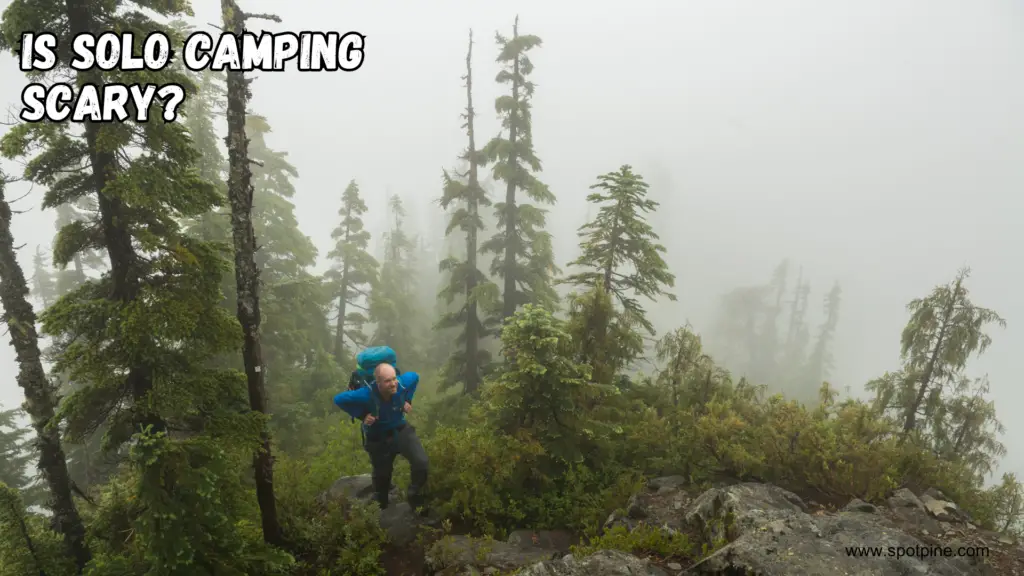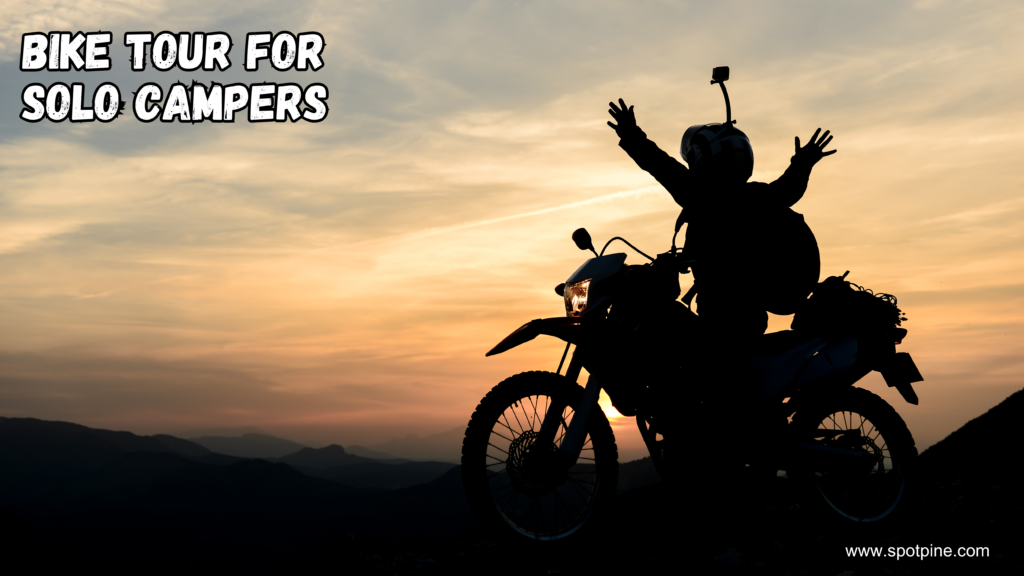Solo camping can indeed be intimidating, especially for beginners. The fear factor varies from person to person.
Embarking on a solo camping adventure may stir up a mix of excitement and apprehension. For many, the prospect of solitude amidst nature is invigorating, providing a rare chance for self-reflection and a break from the hustle of daily life.
Yet, the idea of being alone in the wilderness can also evoke fears, stemming from concerns about safety, wildlife encounters, or the unfamiliar sounds of the outdoors at night. These fears, while natural, often give way to confidence as campers become seasoned through experience and preparation. Equipping oneself with the right gear, knowledge, and a solid plan helps mitigate risks and enhances the enjoyment of solo camping. It’s a journey that offers empowerment, peace, and the joy of self-sufficiency, as long as the camper respects nature and stays aware of their surroundings.
The Thrill And Chills
Solo camping strikes a unique balance between exhilaration and trepidation. It’s a journey providing an intense taste of freedom, punctuated by moments of adrenaline. This experience is ripe with emotions that range from serenity to suspense.
Solo Camping Emotions
The rollercoaster of feelings you experience while solo camping cannot be understated. Imagine the joy of solitude, the peacefulness of nature’s lap, and the sense of accomplishment from fending for yourself. These are the highs. Yet, there may also be lows. Unexpected noises or the isolating darkness can stir up anxiety. The trick is to embrace both ends of this emotional spectrum.
- Excitement at discovering your capabilities
- Solitude fostering deep reflection
- Anxiety test your resolve
- Triumph when you conquer fears
Confronting The Night Alone
As the sun dips below the horizon, solo camping shifts. Night envelops your campsite, and the challenges begin. Your senses heighten, every rustle seems louder, and the silence more profound. It’s you versus the night. Preparation is your armor; picking a safe campsite, setting up proper lighting, and having a contingency plan are key. These strategies transform worry into confidence, ensuring the chills of the night become part of the thrill.
| Before Nightfall | During the Night | If Anxiety Hits |
| Choose a safe spot | Use solar lights | Breathe deeply |
| Set up camp meticulously | Keep a whistle nearby | Focus on positive thoughts |
| Map out an escape path | Secure food from wildlife | Visualize a calm space |
Debunking Solo Camping Fears
Welcome to our deep dive into ‘Debunking Solo Camping Fears’. Many find the idea of solo camping intimidating. Indeed, setting out alone can trigger a range of concerns. Yet, with planning, knowledge, and a touch of courage, solo camping becomes a liberating experience. Let’s address those fears head-on and turn them into thrills.
Wildlife Worries
Nature is home to wildlife, a fact that’s both thrilling and a cause for concern among solo campers. But fear not! Most animals prefer to keep their distance. Ensure food is stored correctly by using bear canisters or hanging food bags. Learn about local wildlife and how to respond in an encounter. Carry noise-making devices to alert animals to your presence and consider taking a self-defense class or carrying bear spray for peace of mind.
- Food storage is vital to keep animals away.
- Knowledge is power; learn about local wildlife.
- Carry protection like noise-makers and bear spray.
The Silent Solitude
The silence of solo camping can be profoundly peaceful or eerily quiet. Embrace the chance to reconnect with yourself and the environment. Activities such as reading, journaling, or photography can fill the quiet moments. Look at solitude as a positive space for reflection, not as an abyss of loneliness. Prepare a playlist or download podcasts if complete silence feels too overwhelming.
| Activity | Purpose |
| Reading | Mental stimulation |
| Journaling | Reflection and memory keeping |
| Photography | Engaging with surroundings |
| Music/Podcasts | Comforting background noise |
Solo Camping Safety Tips
Embarking on a solo camping adventure can stir a mix of emotions, from excitement to trepidation. Ensuring safety while reveling in solitude can transform any anxiety into peace of mind. Preparedness and wise decision-making pave the way for a successful and secure experience. Delve into these crucial solo camping safety tips to maintain confidence and tranquility in the great outdoors.
Selecting A Safe Site
Your campsite is your wilderness home. Careful selection is key.
- Research: Before heading out, thoroughly research potential sites. Look for reviews and recommendations.
- Visibility: Find a spot that’s visible and not isolated to ensure you can be seen or heard in case of an emergency.
- Ground: Choose level ground for stable tent placement to avoid flooding during rain.
- Overhead: Be mindful of what’s above you. Avoid camping under loose branches or hazardous trees.
- Proximity: Stay close to water sources for hydration, but not too close to prevent water hazards and dampness.
Emergency Preparedness
Staying safe means being ready for the unexpected. Don’t let an emergency catch you off-guard.
| Item | Purpose |
| First Aid Kit | Manage minor injuries quickly. |
| Emergency Whistle | Signal for help if needed. |
| Map and Compass | Navigate without relying on electronics. |
| Multi-tool | Handle various tasks and repairs. |
| Water Purification | Ensure access to safe drinking water. |
| Fire Starting Kit | Maintain warmth and cook meals. |
In addition to the table above, always inform someone of your plans including your return time. Keep a fully charged phone and a backup power source. Remember, solo doesn’t mean insecure. With these safety tips, solo camping can be an empowering and serene experience, free of fear.
Know More About Solo Camping Safety Tips
Equipping For The Solo Adventure
Tackling a solo camping trip stirs a mix of excitement and fear. It’s natural to feel a bit daunted, but with the right equipment, the fear transforms into exhilarating self-reliance. Embrace the preparation phase as the first step in your adventure.
Must-have Gear
Gearing up is crucial for a successful and safe solo camping journey. The essentials contribute to comfort, safety, and the ability to cope with unexpected situations.
- Tent: Your shelter from the elements.
- Sleeping Bag: For warmth during chilly nights.
- Headlamp: Hands-free navigation in the dark.
- First Aid Kit: Be prepared for minor injuries.
- Water Filter: Access to clean water is a must.
- Multi-tool: Versatility at your fingertips.
- Fire Starter: For warmth and cooking.
- Map and Compass: Tech can fail, old-school navigation won’t.
Checkout Solo Camping Gear List From Here
Tech To Keep You Connected
Technology bridges the gap between solitude and safety. It keeps you connected to the outside world and can be a lifeline in emergencies.
| Tech | Purpose |
| Smartphone: | Maps, apps, and emergency calls. |
| Portable Charger: | Keeps devices powered up. |
| Satellite Messenger: | Communication off the grid. |
| Solar Charger: | For renewable power sourcing. |
| GPS Device: | Precise location tracking. |
Mental Hurdles Of Camping Alone
For many, the very thought of solo camping sends chills down the spine. Silence amplifies sounds. Shadows morph into fears. Yet adventure waits. The solitude of the wild calls to intrepid spirits. But first, overcoming internal barriers is key.
Overcoming Fear
Confronting the darkness waiting beyond the tent seems daunting at first. Night’s noises stir imagination and fears. Overcoming fear starts with small steps:
- Knowledge – Learn about local wildlife and how to stay safe.
- Preparation – Equip yourself with necessary survival gear and tools.
- Familiarity – Begin with locations you know before venturing into unknown terrains.
Each safe return builds resilience, transforming the unknown into the known.
Building Confidence
Self-reliance blooms in solitude. With each solo trip, confidence grows. Techniques to foster this growth:
- Set up camp before dusk. It brings peace of mind.
- Stay busy. Create a routine to maintain focus.
- Practise makes perfect. Regular solo trips make you proficient in camping skills.
Confidence gained reflects in daily life, encouraging bolder choices and a stronger, more independent you.
Read How To Conquer Solo Camping Fear
Women On Solo Camps
Embarking on a solo camping adventure can stir a mix of emotions, from exhilaration to fear, especially for women. Yet, many women are choosing solo camping as a way to reconnect with nature, seek solitude, and challenge themselves.
Challenging the Myths
Challenging The Myths
Solo camping as a woman often brings with it a host of myths and misconceptions. Stories of danger and vulnerability in the great outdoors may cause hesitation. Let’s dispel these myths:
- Myth: Solo female campers are not safe.
- Truth: With proper planning and awareness, solo camping can be just as safe for women as it is for men.
- Myth: You need to be extremely experienced to camp alone.
- Truth: Even beginners can enjoy solo camping with careful preparation and research.
Safety Strategies for Solo Women Campers
Safety Strategies For Solo Women Campers
Staying safe is paramount for enjoying solo camping trips. Here are safety strategies specifically tailored for solo women campers:
| Strategy | Description |
| Research Your Campsite | Choose known campsites with positive reviews from other female campers. |
| Inform Someone | Always let a trusted person know your itinerary and expected return time. |
| Self-Defense | Carry self-defense items and know how to use them effectively. Always obey local laws. |
| Stay Connected | Carry a charged phone and a portable charger or consider a satellite communicator in remote areas. |
Trust your instincts. If something feels off, it’s okay to pack up and leave. Better safe than sorry. Equip yourself with knowledge, gear, and confidence.
- Plan your trip during a time that’s best for you, considering weather and daylight hours.
- Master basic survival skills and first aid before heading out.
- Keep a whistle and flashlight handy at all times.

Tales From The Tent
Every solo camper has their own “Tales from the Tent.” Let’s dive into the thrill and fears of braving the wilderness alone!
First-timers’ Experiences
First solo camping trips can be a mix of excitement and anxiety. Reading first-hand stories helps.
- Jane’s first night alone was a test of courage.
- Mark overcame the fear of isolation with each passing hour.
- Sarah discovered newfound respect for nature on her first trip.
Unexpected Encounters
Wildlife visits or strange noises can make the heart race. Here’s what some campers encountered:
| Camper | Encounter |
| Tony | Owl hooting at night |
| Lisa | Rustling leaves nearby |
| Bob | Deer grazing at dawn |
Embracing The Solitude
Is solo camping scary? It’s a question many ask before venturing into the wilderness alone. But solo camping opens the door to inner peace and balance. Embrace the solitude and let yourself discover the quiet strength and clarity that comes from being truly alone with nature.
Mindfulness In Nature
When camping solo, every sense awakens. Sounds, smells, and sights become more intense. This immersion in nature encourages a deep state of mindfulness that repairs the soul. Solo trips provide a unique chance to reset and engage fully with the present moment, letting go of past worries and future stresses.
Solo Camping Benefits
- Boosts self-reliance: All decisions rest on your shoulders, strengthening decision-making skills.
- Enhances problem-solving: Unexpected challenges teach creative resolution techniques.
- Improves mental health: Solo time reduces stress and improves overall mood.
- Encourages self-discovery: Time alone leads to personal insights and growth.
Indeed, conquering the initial fear of solo camping unlocks a world of benefits that contribute to personal development and happiness.
Community And Solo Camping
Solo camping brings unique thrills and challenges. Many fear the experience due to solitude. Yet, a vast community exists, prepared to embrace, guide, and journey with fellow solo campers.
Sharing Experiences Online
Campers conquer fears by sharing stories. Digital platforms serve as libraries of adventure, filled with lessons and joy. They forge a sphere where solitude fades behind a screen of shared knowledge.
Finding Solo Camper Communities
Communities unite solo campers. Websites and apps become virtual campfires, where tips, locations, and support are just a click away. They ensure the solo journey is never truly alone.
Before The Solo Journey
Solo camping invokes a thrill like no other. It’s an encounter with the untamed wilderness, a test of self-reliance. Yet, before stepping out alone, pre-trip preparations are crucial to ensure a safe and enjoyable adventure.
Planning Your Trip
Embarking on a solo camping journey requires meticulous planning. This blueprint for success covers every aspect of the trip, from start to finish.
- Select a campsite that’s known for safety and has clear emergency access.
- Inform a close contact about your plans, including location and duration.
- Prepare a checklist of essentials—you’ll need gear like a tent, sleeping bag, and enough food and water.
- Research the weather forecast to pack appropriately and avoid unexpected storms.
It’s always better to over-prepare than to find yourself lacking in the great outdoors.
Mental Preparation
Confidence is key. Solo camping can trigger fears, but overcoming these concerns starts within the mind.
- Visualize a successful trip—imagine setting up camp, enjoying nature, and sleeping beneath the stars.
- Practice mindfulness—stay present and soak in the serenity of nature.
- Learn basic survival skills and first aid—it boosts your self-reliance and calms nerves.
- Start gradual—consider a one-night stay nearby before tackling more ambitious trips.
Equip your mind just as you would your backpack, and you’ll turn apprehension into anticipation.
Progression To Confidence
Progression to Confidence in solo camping is a journey that begins with a single step into the wilderness. It molds trepidation into empowerment, transforming solitude into a space where confidence thrives. Solo camping might begin with fear, but it gradually gives way to a sense of liberation and self-reliance that’s both rewarding and exhilarating.
Starting Small
Begin with familiar, nearby environments. Opt for a well-known local campground for your first adventure.
- Research the area thoroughly.
- Spend a day to acquaint yourself before an overnight stay.
- Short trips ease you into the solo camping experience.
Gradually Facing Fears
Step by step, push your comfort boundaries. Tackle one anxiety at a time and acknowledge your growth.
- Begin with day hikes before a night stay.
- Progress to overnight trips in areas with some camper presence.
- Over time, venture into more secluded spots.
Answering Common Queries
Embarking on a solo camping adventure can stir a mix of emotions, from excited anticipation to a touch of fear. Let’s tackle some of the burning questions you might have.
Is It Normal To Be Scared?
Feeling fear is a natural response when stepping out of your comfort zone. Solo camping takes you into the unknown, so it’s completely normal to feel scared.
Why Camp Alone?
- Personal growth: Solo camping builds independence and confidence.
- Peace and quiet: Without companions, you’ll find serenity in nature’s embrace.
- Flexibility: Camp on your own terms, without the need for compromises.
Conclusion
Facing the wilderness solo certainly stirs up fear for many. Yet, the thrill and self-discovery it promises can outweigh the trepidation. Remember, preparation and knowledge are your allies against fear in the wild. Embrace the challenge; for most, solo camping evolves from scary to deeply rewarding.
It’s not just about survival—it’s about finding your inner strength. Happy camping!




Pingback: Camping Stories To Raise The Spirits: Inspiring Tales for Campers